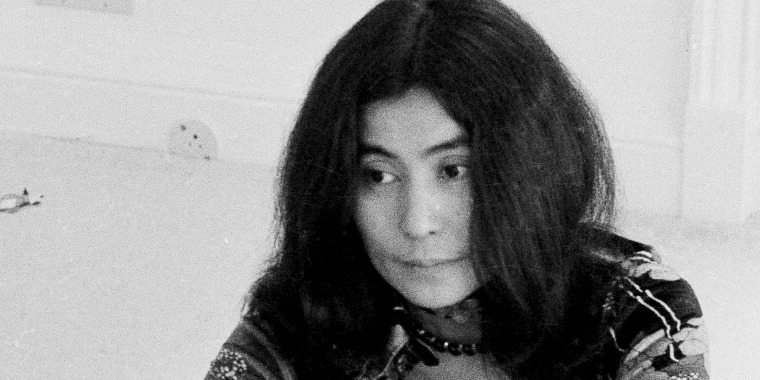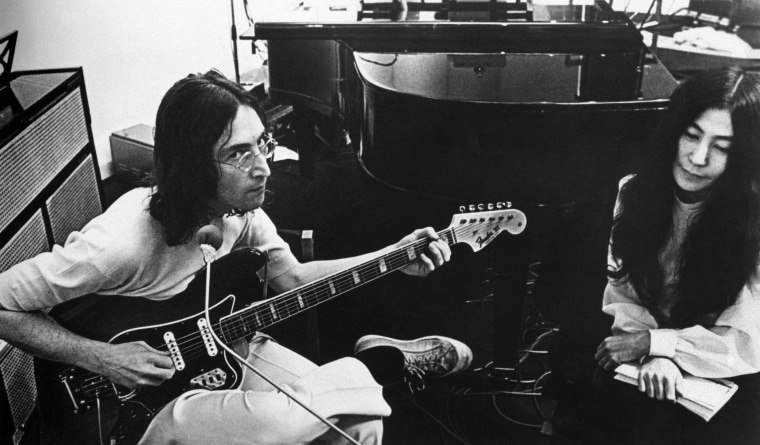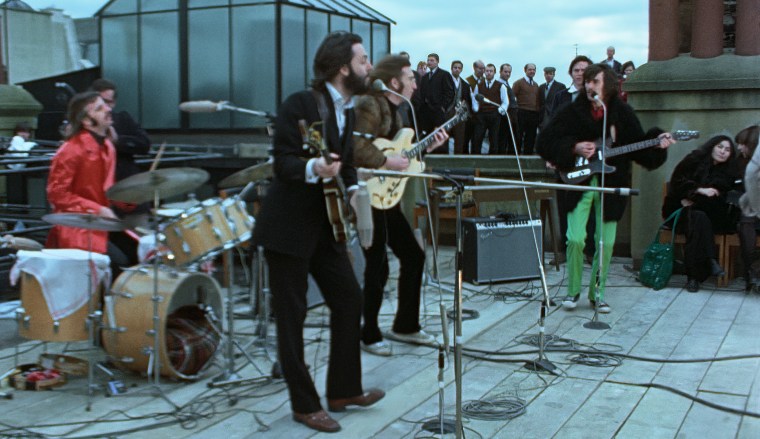Yoko Ono was called ‘dragon lady,’ blamed for Beatles breakup. Now, her legacy is re-examined
The new docuseries “Get Back” is making fans re-evaluate Yoko Ono’s relationship with the band. But any reckoning must contend with the racism and sexism she faced, experts say.

Yoko Ono, at home July 1971. Getty Images file
After enduring a half century of vitriol for allegedly “breaking up” The Beatles, Yoko Ono’s contentious place in pop culture is once again being re-examined following the release of Peter Jackson’s new documentary series “Get Back.” The reckoning coincides with a growing, broader movement in which many are interrogating the ways Asian women have been depicted and the consequences of misrepresentations, experts say.
Ono, who was married to Lennon for 11 years before his assassination in 1980, is hardly the main subject of the eight-hour series on Disney+, in which she’s credited as a producer. But her appearance has prompted viewers to see her differently. While she’s long been blamed for pulling Lennon away from his bandmates — The Beatles broke up a year after Ono and Lennon married — for many viewers, her behavior in the documentary, which Jackson described as “benign,” shows no such thing, and has led many critics to call for a collective apology toward her.
But this cultural moment of self-reflection is incomplete, experts say, without examining the sexism, racism and xenophobia that contributed to Ono’s vilification.
Ono, an accomplished performance artist before she met Lennon, was routinely demonized in both the British and American press, and by Beatles fans. “John Rennon’s Most Excrusive Gloupie,” read one 1970 Esquire magazine article about Ono, mocking her Japanese accent. According to the 2004 book “John Lennon Imagined: Cultural History of a Rock Star,” fans would often surround The Beatles company headquarters in London and call Ono a “’nip,’ ‘Jap,’ ‘Chink’ and other insulting names, insisting that she should get back to her own country.”

These descriptions of Ono were common and persisted for decades. In a 2018 episode of the TV show “Family Guy,” for instance, Ono is described as the “woman crawling out of the well from ‘The Ring,’” a reference to a supernatural being in the popular Japanese horror film.
Experts said the villainization of Ono was rooted in demeaning stereotypes about Asian women that were inflamed by the political climate of the time. Ono’s refusal to capitulate to any of the criticism and minimize the heavily maligned aspects of herself, experts add, was a subtle yet powerful act of resistance.
“They’re four full-grown men in a band together in a domain that is already very tenuous, where you see lots of bands break up,” Nadia Kim, a professor of Asian and Asian American Studies at Loyola Marymount University, told NBC Asian America. “So the question itself that people pose, that she could have broken up ‘The Beatles,’ the racist and sexist and nativist dimensions of the question, show how preposterous it is.”
The docuseries, which debuted last month, follows the band through the making of their 1970 album “Let It Be.” In it, Ono remains in the periphery. Described by British and American tabloids as a master manipulator of Lennon and a divisive presence among the band members, Ono is shown in the documentary doing mundane activities like knitting, reading the newspaper, or eating what appears to be a chicken cutlet as the band rehearses. In one scene, she is seen deep in conversation with McCartney’s wife at the time, Linda Eastman. Though omnipresent in the footage, Ono never appears to meddle in the band’s affairs or opine on any of their decisions.
In recent years, many have come to acknowledge the role that sexism played in Ono’s image in the press. Kim said women are too often blamed for men’s failures and given no credit when men succeed. But Kim also underscored that the way Ono, a Japanese immigrant, was uniquely singled out. Other band members also had long-term partners — including Eastman and George Harrison’s partner, Pattie Boyd, who were white — but they were never blamed for The Beatles’ breakup. Ono herself blamed “sexism, racism” for the accusations, telling CNN’s Anderson Cooper in 2010 that she had been “used as a scapegoat.”

Ono was also regularly labeled a “dragon lady.” Loren Kajikawa, an associate professor of music at George Washington University who specializes in race and politics in American music, said the dragon lady trope comes from the idea that Asian women are conniving beings who use seduction in manipulative, dangerous ways. Asian female power, Kajikawa said, has often been met with these accusations of deceitfulness.
At the height of The Beatles’ popularity in the 1960s, Britain was also experiencing a resurgence of nativism.
The docuseries briefly showed how the song “Get Back” was a commentary on the xenophobic views of Enoch Powell, a member of Parliament, Kajikawa pointed out. An early version of the song parodied Powell’s incendiary “Rivers of Blood” speech, in which he warned that if immigration persisted, a violent race war would be inevitable. Against this political backdrop, many would always see Ono as an outsider, no matter how long she lived in Britain or the U.S., Kim said.
Grace Hong, director of the Center for the Study of Women at the University of California, Los Angeles, said the incessant attacks on Ono for her appearance, with the media repeatedly describing her as “ugly,” also had roots in racism. Ono, who came from the avant-garde art scene and, with her long black hair and Japanese features, did not fit the European standards of beauty, was often compared to the other band members’ partners, who were thought to embody a more glamorous aesthetic.
“Yoko’s purported ugliness has all sorts to do with expectations about white femininity, and the ways in which she wasn’t fitting into that,” Hong said.
But as she weathered the vitriol, Ono did not appear to change her behavior or style, Hong added.
“People really resented the public staging of their relationship and the sexual nature of it. There’s the magazine cover where John Lennon’s naked and he’s straddling Yoko Ono, he’s passionately kissing her,” Kim said. “It’s like, ‘Why does she deserve to be the girlfriend of John Lennon when it should be a nice English, i.e. white girl, or a nice white American girl?’”
Given this perceived racial hierarchy, and Lennon’s status as one of the most desirable men from Britain, Ono’s passionate relationship with him alongside her own refusal to assimilate made her a “threat,” Kim said.
“Nothing angers the people who are, I guess, native-born members of Great Britain, or the United States, more than an immigrant who seems to be eclipsing them or overtaking their place,” Kim said. “She never pandered or genuflected, and especially for someone who was a public figure, that just enraged people. … It’s the idea that she can’t fully have her personhood, that we have to dehumanize her in some way because she’s, in our eyes, not equal anyway.”
While some are calling for a reframing of Ono’s place in history, Kajikawa said that some defenses of her as an unobtrusive, quiet presence play into other stereotypes of Asian women.
“That vindication, in some ways, is moving her from being the dragon lady that broke up the Beatles to being the submissive passive Yoko Ono, which is also not fair necessarily,” Kajikawa said. “The idea that that vindication has wrested on how she’s not doing anything in the documentary, also, for me, falls back on a familiar, stereotype of Asian femininity.”
In reality, Ono was known to be anything but “quiet,” Kajikawa said. Though Ono seemed unbothered by the insults, when asked how she felt about the “dragon lady” label, she said she was “honored,” adding that “the dragon is a very powerful, mythical animal . . . well, probably they think I’m powerful, thank you very much.”
Ono’s insistence on sharing space with a legendary band that’s making history is a powerful statement, even if it is perhaps an unintentional one.
“The Beatles are a defining group of the 20th century in some ways. The fact that Yoko insisted on being there, so that in some way, we can see something nonwhite in the frame of this history, is really important and cool,” Kajikawa said. “It does go against this idea that we can imagine the Beatles as something that was like all-white, all born in Britain … like there’s a version of her presence that challenges the ownership of that history.”





